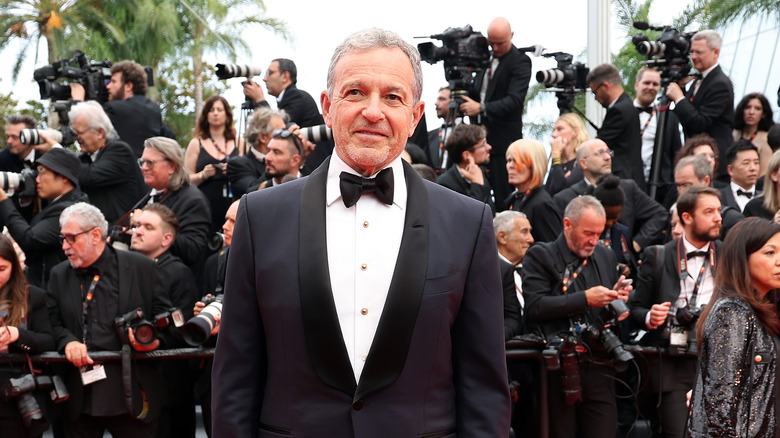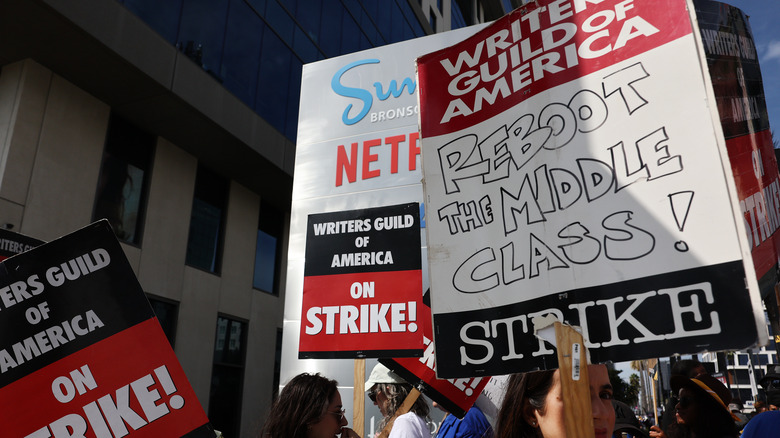The WGA Request That Made Disney's Bob Iger & More Studio Bosses Furious
Editor's Note: An earlier draft of this article mistakenly reported a detail of the WGA contract's stance on studios using AI to revise scripts. We have corrected it to more accurately reflect the WGA's concession that studios can use already-owned scripts to train AI and experiment with it — but not to revise scripts.
The Writers Guild of America and major studios finally reached an agreement, ending the historic WGA strike — but unsurprisingly, there was some serious drama surrounding those last few days of negotiations.
According to a piece in The Hollywood Reporter that spoke to various sources on both sides of the strike, Disney CEO Bob Iger was furious when the WGA made what he regarded as a "late ask" as negotiations started to wrap up on September 21. As the piece notes, out of the major studio heads who sat down with WGA's chief negotiator Chris Keyser — Iger, David Zaslav of Warner Bros. Discovery, Donna Langley of NBCUniversal, and Ted Sarandos of Netflix — Iger is the only one who led a studio through the previous writers' strike in 2007, but he's also the one who stormed out of the room over a request by the WGA that THR says wasn't particularly unexpected. That ask? The WGA requested that guild members would be free of consequences if they refused to cross picket lines set by other guilds (like SAG-AFTRA, which is still striking as of this writing).
THR reports that Iger "angrily left the room" with Sarandos, Zaslav, and Langley, while Zaslav said to Keyser and other WGA members, "What are you guys doing? We're on the 10-yard line ... we've given you virtually everything you said you wanted." After Keyser spoke to Iger, the negotiations resumed and ended with a deal that satisfied WGA members, and the guild is set to return to work.
The WGA and studios both stalled for weeks before reaching a deal
Apparently, Iger wasn't the only one frustrated during ongoing negotiations over the strike — in August, talks slowed when neither side would make a counteroffer. According to WGA negotiators, the studios basically said the guild should take the deal they were given and live with it: "We were met with a lecture about how good their single and only counteroffer was." From then, the guild just stopped talking to the studios at all, but apparently, a few showrunners got irritated that WGA negotiators weren't making enough of an effort.
As one unnamed showrunner told THR, "Clearly people like Kenya [Barris, showrunner of 'black-ish'] wanted information. There was no coup. We were just asking the questions that were on everybody's minds. The thing with showrunners is, they're CEOs in their own right, running massive corporations with huge deals at studios. Noah Hawley, for example, has two shows and employs a thousand people. We were all doing our part to get people away from the brink of bankruptcy and back to work." Another anonymous showrunner agreed: "The WGA dug their heels in and felt [the AMPTP] had to call us. Then Chris Keyser, [co-chair of the WGA's negotiating committee], started to hear from Teamsters, as well, to do something. It wasn't anger about the strike or being asked to fold; it was anger about the lack of attempt to restart things."
What are the important points of the WGA deal, and what happens now?
So what did the writers get the studios to agree to in the end? Quite a lot, actually, according to the New York Times. A big bone of contention between studios and the guild was streaming residuals — and not only will writers earn more residuals from streaming hits to begin with, but they'll get bonuses if those shows perform well based on subscriber numbers for each streamer. Writers asked for a minimum of six writers in each writer's room, and while they didn't get that, they got the studios to agree to a minimum of three writer-directors per room. One of the other big sticking points was the use of artificial intelligence, and while the issue is definitely complicated, the deal states that studios cannot replace writers with A.I., nor can they force writers to utilize it ... but studios can use scripts they already own to train AI tools and experiment with them.
What happens now that the WGA has reached a deal? Well, writers are cleared to return to work — late-night shows are already resuming — but even so, the THR report doesn't end optimistically. A showrunner the outlet described as "well known" addressed the fact that the industry will still face problems, which could affect future projects and discourage would-be writers from trying to forge a career. "Everybody will call it before the strike and after the strike," they said anonymously, concluding, "but it's really kind of before peak TV and after peak TV."


